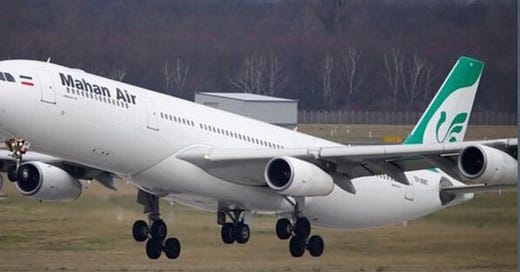NK universities reaching out; Two Airbus A340's arrive in Iran; OFAC sanctions Iranian ballistic missile procurement network.
Prohibited Transactions for the week of 5 June 2023 (#7)
North Korea
Pyongyang ordered North Korean universities to increase international academic exchanges and cooperation with foreign universities, in particular on topics such as economics, commerce, finance, information technology and international law. //Will they find many universities outside of the PRC and Russia to cooperate with? This reminds me of previous work done on the sanctions and proliferation risks of academic collaboration with North Koreans due to the potential for intangible transfers of technology (ITT).
South Korea’s foreign minister stated that the UN Security Council is essentially paralyzed when dealing with North Korea’s missile launches, as Russia and the PRC are able to block new sanctions against the DPRK. //Moscow, Beijing, and Pyongyang may come to regret this strategy, as it results in Washington DC, Seoul and Tokyo better coordinating and cooperating in response to DPRK missile tests and other proliferation-related activities.
North Korean hackers Lazarus Group may be responsible for the theft of USD35 million worth of digital currency from Atomic Wallet, a virtual currency wallet service. New research also shows that North Korean hackers are spoofing banks and venture capital firms in the US, Vietnam, and Japan.
The US estimates that half of North Korea’s foreign-currency incomes comes from cyberattacks.
A British marine insurance salesman violated UN sanctions against the DPRK by issuing between 29 and 100 fraudulent insurance certificates to North Korean vessels from 2011 to 2016, which the vessel operators could use as proof of insurance when making port calls. //The UK government was apparently aware that sanctions violations were occurring, but for unclear reasons, took no action.
North Korea may be looking to “de-dollarize” its economy, but North Korean leader Kim Jong-un has limited options to prevent citizens from using USD and RMB, especially as foreign exchange rates climb to pre-COVID levels.
Iran
Tehran has purchased and received two Airbus A340 passenger planes which were originally used by the French air force, before being sold to a French maintenance company in December 2020. In turn, the planes were sold in 2022 to a Malian company that is a front for Mahan Air, an Iranian airline designated by the US over a decade ago. The two A340’s were stored in Indonesia, and the Malian company recently declared their intention to fly the planes Mali, though the actual destination was Iran. //Procuring airplanes is not the same as trying to get your hands on dual-use or military goods such as missile components, but the fact that these planes made it to Iran is a reminder that Tehran is literally able to punch an airplane-sized hole through Western sanctions regimes.
Iranian media is reporting that Tehran is in talks with neighboring countries — including Saudi Arabia, the UAE, Qatar, Bahrain, and Iraq, as well as India and Pakistan — to establish a naval coalition in the region. //Two Iranian newspapers are reporting slightly different things, so it’s not clear if the naval coalition will be focused on the Persian Gulf, or the northern Indian Ocean. But either way, any sort of increased naval activity by this new coalition — which is also receiving Chinese support — could impact the smuggling and illicit networks operating in the region.
Islamabad has established rules that allow for barter trade between Pakistan and Iran — as well as Afghanistan and Russia — in order to reduce dependance on the US dollar. Pakistan will be able import “fruits, nuts, vegetables, spices, minerals and metals, coal and related products, petroleum crude oil, LNG and LPG, chemical products, fertilizers, article of plastics and rubber, raw hides and skins, raw wool and articles of iron and steel” from Iran.
The leader of the Iran-Russia Joint Chamber of Commerce stated that use of the Russian ruble and Iranian rial in mutual settlements between the two countries exceeds 60 percent.
Russia and Iran have also discussed strengthening cooperation between their respective petrochemical industries.
Tehran will soon send a large Iranian business delegation to Brazil to discuss increasing investments and trade opportunities between the two nations, with hopes that trade between the two can eventually reach USD10 billion. This follows the decision by Rio de Janeiro to allow two sanctioned Iranian warships to dock at a Brazilian port in late February 2023.
Two as yet unnamed Iranian banks are likely to set up branches in Brazil in the near future.
OFAC sanctioned eight individuals and six entities in Iran, the PRC, and Hong Kong for conducting financial transactions which “facilitated procurement of sensitive and critical parts and technology for key actors in Iran’s ballistic missile development.” The companies and individuals were involved in selling technology — such as centrifuges and dual-use metals — to previously sanctioned Iranian entities which are subsidiaries or affiliates of Iran’s Ministry of Defense and Armed Forces Logistics.
The US government also sanctioned the Iranian internet company Arvan Cloud, two of its employees, and the company’s Dubai-based affiliate for facilitating the government’s censorship of the internet in Iran.
Some observers questioned if sanctioning these types of technology companies runs counter to the US government’s goals of promoting internet freedom in Iran, since cracking down on digital services in the country results in more restrictions.



